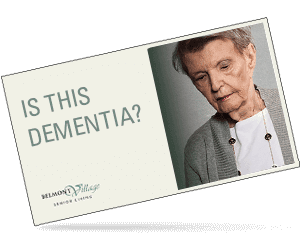Recognizing the signs
Noticing early signs of cognitive decline can be emotional—for both you and your loved one. Subtle changes in a loved one’s health, memory, and behavior that once seemed like a normal part of the aging process can start to become more noticeable—and more worrisome. You’re unsure what to do, what to say, or how to approach the situation. And your loved one may feel confused and anxious. But before you and your family can offer the care and support they need, the first step is to recognize and understand the early warning signs of dementia.
“Changes can be subtle for some – especially in the early stages. Signs can vary and so can their level of intensity,” says Beverly Sanborn, MSW, LCSW, gerontologist for Belmont Village Senior Living. “If the warning signs are consistent and on-going, it’s an indication that the senior’s safety may be in danger. An assessment to understand the causes of memory loss is in order at this point—both for your loved one’s safety and your own peace of mind.”
10 common indicators of cognitive decline
-
Short-term memory lossYour loved one may struggle with remembering recent information, such as what they ate for lunch that day, where they left something, or what they were about to say. They may become repetitive—saying the same things or asking the same questions over and over.
-
Social withdrawalSocial isolation is difficult for everyone, but for an aging body and brain, it can worsen cognitive decline and risk of dementia. Older adults who feel isolated or lonely may start to have trouble keeping up with conversations. They may stop talking mid-conversation or struggle to find the right words. As a result, they often withdraw from social activities and lose touch with friends or family.
-
Changes in personality or behaviorA person in the early stages of dementia may experience mental health decline, including mood swings and abrupt personality changes. They may show poor judgment or act out of character, often becoming paranoid, confused, fearful, depressed, rude, or easily upset.
-
DepressionYou may notice your loved one sleeping or crying a lot more than usual. They may feel lonely, sad, depressed, and hopeless. And, in their daily life, they aren’t participating in activities they used to love.
-
Extreme forgetfulnessMisplacing things from time to time or forgetting a random name or date is considered normal forgetfulness. However, finding keys in the freezer, having trouble re-tracing steps, or forgetting to turn off the stove can be signs of something more serious.
IS THIS DEMENTIA?
Take our complimentary “Is this dementia?” questionnaire for a quick assessment of the changes you’re noticing.
-
Changes in personal care and hygieneA loved one with dementia may exhibit noticeable weight loss from irregular dietary patterns and eating habits. You may also notice them struggling with care in their daily life, which might include bathing less frequently or wearing the same clothes repeatedly without washing.
-
DisorientationPeople with dementia, such as Alzheimer’s disease, can get confused about time and place. They lose track of the day, year, or season. They may get lost easily. Sometimes they forget where they are or how they got there, which could unintentionally expose them to health or safety risks.
-
Incorrectly taking medicationsPeople with dementia may neglect their health care. For example, they may forget to take their medication, causing them to skip prescribed doses. Or they may forget that they’ve already taken their medicine and end up taking multiple doses, risking an overdose.
-
Decreased ability to perform simple, familiar tasksA loved one may start having trouble with daily tasks, such as driving, keeping track of their spending, organizing a grocery list, etc. Or they may lack follow-through—starting tasks and never finishing them.
-
Poor home maintenanceYou may start to see signs of memory impairment around the house—piles of dirty dishes, forgotten laundry, and unsorted mail. In extreme cases, clutter can accumulate to the point that it becomes a health and safety issue.
Early intervention helps
Sometimes it can be hard to differentiate between normal aging, stress, and cognitive decline – especially in the early stages. It’s important to take a proactive caregiving approach to memory impairment.
“Spending a few days with an aging parent or loved one is a good way to see how they’re doing and where they might need a little more support,” says Joyce Mahoney, Regional Vice President of Memory Care and Programming, Belmont Village Senior Living. “We often hear from family members that they’ve seen signs of concern that aren’t readily apparent in routine phone calls or quick visits.”
Early diagnosis and treatment for Mild Cognitive Impairment (MCI), such as Belmont Village Senior Living’s Circle of Friends® program, have been proven to slow the progression of dementia. A Whole-Brain-Fitness approach—mental stimulation, socialization, and healthy lifestyle—builds cognitive reserve in the brain, allowing seniors to maintain function and higher quality of life.
According to Mahoney, Alzheimer’s disease remains the most common type – making up 60-80% of all dementia cases. However, there are more than 80 types of dementia, including Alzheimer’s, Parkinson’s, Lewy Body, vascular dementia, and frontotemporal dementia that manifest in different ways. It’s normal to want to dismiss the early signs, but if memory lapses are consistent enough to cause concern it’s best to get help. There may be an underlying cause that’s correctable.
To learn more about navigating challenging behaviors associated with dementia, watch our educational webinar, “Dementia 101”, hosted by Joyce Mahoney. Watch now»
Is this dementia?
If you’re seeing any of these signs, our “Is this dementia?” assessment can help you gauge the seriousness of your concerns and determine your next steps, such as setting up a professional assessment, exploring treatment options, speaking with a doctor, or reaching out to a Belmont Village senior living care advisor.
If you are seeing warning signs of memory impairment and have concerns or questions about your loved one and the changes they are experiencing, we’re always here to help.
For more dementia caregiver resources, visit belmontvillage.com/dementia-care or call (844) 706-CARE.
The Alzheimer’s Association 24/7 Helpline is also available around the clock, 365 days a year at (800) 272-3900.[/vc_column_text][/vc_column][/vc_row]


